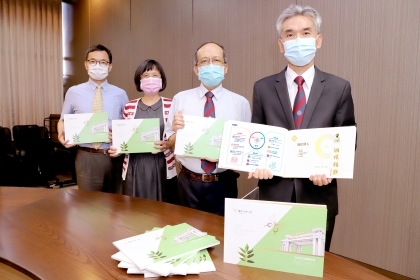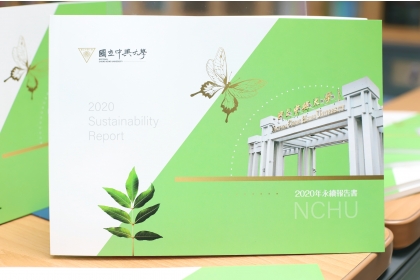National Chung Hsing University Issued the First Sustainability Report, Setting a Model of Sustainability by Action
2021-07-13
興新聞張貼者
Unit秘書室
1,505
National Chung Hsing University published its first Sustainability Report in June this year, with the purpose of conveying to the general public who care about National Chung Hsing University the specific results out of the university’s effort on university governance, social participation and environmental governance on the basis of sustainable development. The report was compiled in accordance with the GRI Standards released by the Global Reporting Initiative. In order to ensure the accuracy of the information, Ernst & Young Taiwan was further appointed to confirm certain information in the report, which has also been certified by CPA’s independent report. The Sustainability Report will be published regularly in the future and will be announced on the website of National Chung Hsing University USR Information Platform (https://usr.nchu.edu.tw/sustainability) for browsing and downloading.
Vice President Ching-Wen Wang and Vice President Jenn-Wen Huang of National Chung Hsing University served as conveners, convening the administrative unit, teaching unit and some research centers to form a task force. Five task force meetings were held to reveal the material issues and the latest information on economic, environmental and social issues that have a major impact on the sustainable development of the university, which were provided for reference to people from all walks of life. The book is divided into 6 chapters, introducing information about National Chung Hsing University, university mission and vision, university governance, social participation, environmental governance, and related appendices.
President Dr. Fuh-Sheng Shieu said that he is very happy to publish a sustainability report this year. The first report is not only a report to the general public on our efforts for sustainable management in 2020, but also has a more significant meaning. It shows that as early as half a century ago, the teachers and students saw the needs of society, used their professions to be committed to social services, worked hard and deeply cultivated, passed on from generation to generation, and persisted to this day. From the compilation process of data collection, theme selection, content focus and overall design, the supervisors and colleagues involved in the work got a deeper understanding of the university. In the future, more experience and energy of the practitioners will be connected, and the three main axes of social progress, environmental protection, and economic growth covered by the SDGs will be closely linked to make greater contributions to Taiwanese society and the international community.
Vice President Ching-Wen Wang and Vice President Jenn-Wen Huang of National Chung Hsing University served as conveners, convening the administrative unit, teaching unit and some research centers to form a task force. Five task force meetings were held to reveal the material issues and the latest information on economic, environmental and social issues that have a major impact on the sustainable development of the university, which were provided for reference to people from all walks of life. The book is divided into 6 chapters, introducing information about National Chung Hsing University, university mission and vision, university governance, social participation, environmental governance, and related appendices.
President Dr. Fuh-Sheng Shieu said that he is very happy to publish a sustainability report this year. The first report is not only a report to the general public on our efforts for sustainable management in 2020, but also has a more significant meaning. It shows that as early as half a century ago, the teachers and students saw the needs of society, used their professions to be committed to social services, worked hard and deeply cultivated, passed on from generation to generation, and persisted to this day. From the compilation process of data collection, theme selection, content focus and overall design, the supervisors and colleagues involved in the work got a deeper understanding of the university. In the future, more experience and energy of the practitioners will be connected, and the three main axes of social progress, environmental protection, and economic growth covered by the SDGs will be closely linked to make greater contributions to Taiwanese society and the international community.



